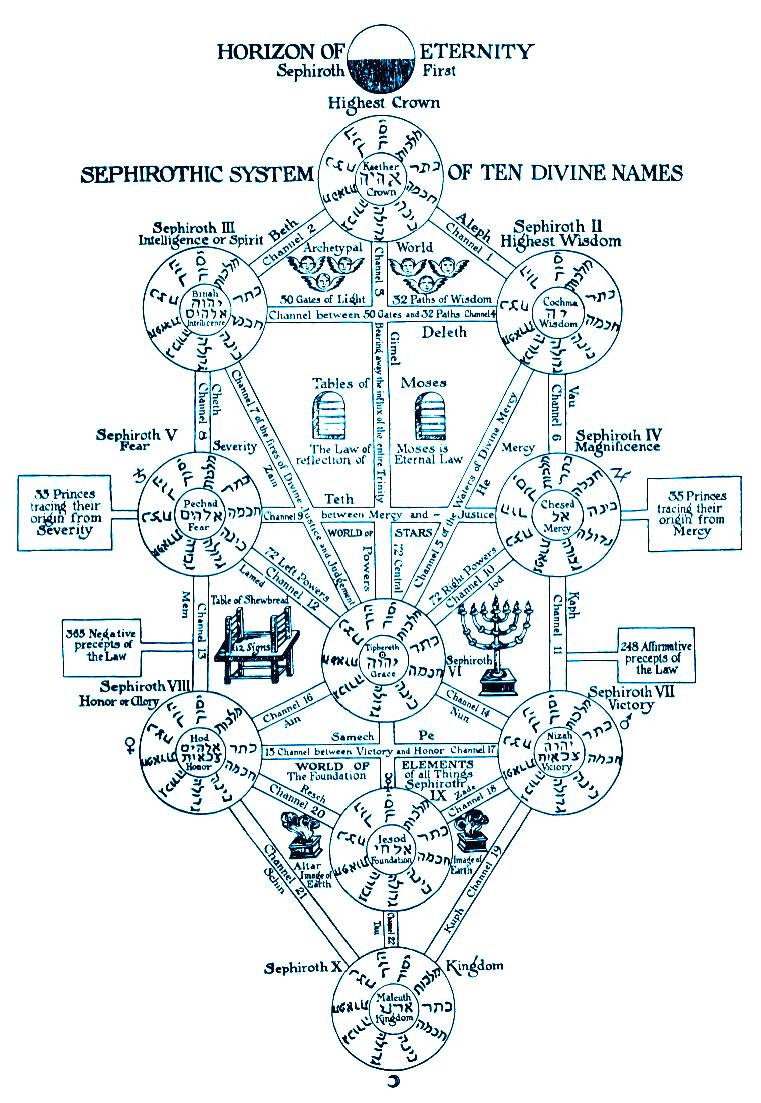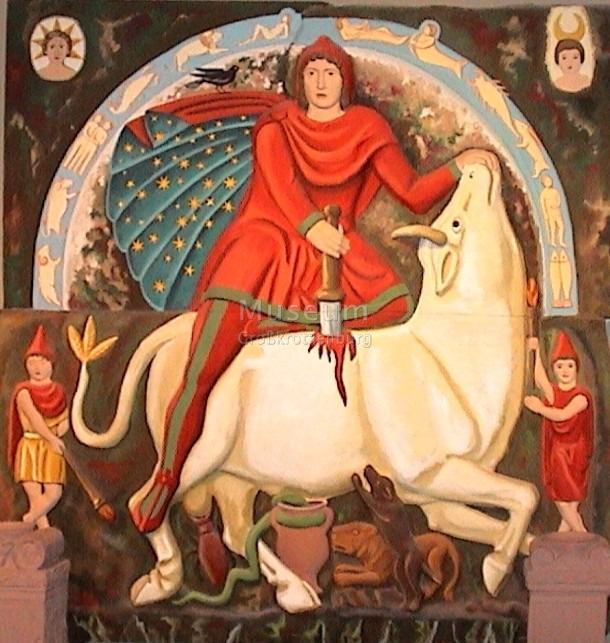|
Golden Dawn Grade Structure
The modern Hermetic Order of the Golden Dawn,
founded in 1888, flourished during the late 19th and early 20th centuries in
England and the United States. The Order was organized in the manner of an
ancient mystery school similar to the Mithraic Cult of the Roman Empire during
the 2nd - 4th centuries A.D. The Golden Dawn (GD) was a strict hierarchical
system; certain information and knowledge was taught only to those students who
had reached specific levels of achievement in their esoteric training. Members
of the Order were required to commit their rudimentary knowledge of the system
to memory, just as if they were students of medicine or law. In addition,
training in the magical arts implies an examination of various regions and
levels of the student’s own consciousness - a process which is not always easy,
and sometimes, not always pleasant. Certain portions of the psyche were left
alone until the student had been thoroughly grounded and balanced by the
step-by-step process of magical development established by the grade system of
the Golden Dawn.
"Kabbalistic Tree of Life" by Athanasius
Kircher
The
"Kabbalistic Tree of Life" is an illustration from a book by the
Jesuit scholar, Athanasius Kircher (1601-1680), entitled "Oedipus
Ægyptiacus" (published 1652).
Kircher's version of the "Tree of Life" has been popular among
mystical groups in both Europe and North America. It is the version
that was used by the Hermetic Order of the
Golden Dawn. The layout of the paths, and the association of the
letters to the paths, varies in different versions, but the Golden
Dawn adopted the basic scheme utilized by Kircher with only minor
adjustments.
One interesting feature of Kircher’s version of the Tree of Life is
the way in which the names of the planets are associated with
principles of the Sephiroth. Kircher attributes the lowest Sephirah,
Malkuth, to the Moon, Yesod to Mercury, Hod to Venus, Netzach to
Mars, Tiphareth to the Sun, Geburah to Saturn and Chesed to Jupiter,
so that the planets are not connected with the three highest
Sephiroth. This scheme entails reversing the normal order of Jupiter
and Saturn, placing Saturn between Jupiter and Mars, against
tradition and actual orbit, and the Sun is placed between Saturn and
Mars, which goes against tradition. The Golden Dawn associations are
almost entirely different: Malkuth is associated with Earth and
Yesod with the Moon, Mercury with Hod and Venus with Netzach;
Tiphareth is still attributed to the Sun, but Mars to Geburah,
Chesed is still attributed to Jupiter, but Saturn to Binah. The Golden Dawn
rearrangement means that the planets follow the ‘Babylonian
order’ (Moon, Mercury, Venus, Sun, Mars, Jupiter, Saturn) exactly,
but one of the three highest Sephiroth is now given a planetary
association.
Shown at the right is a version
of the Kircher Sephirot prepared with English translations of the
Latin text by the 33° Mason, Manly Palmer Hall (1901-1990). |
 |
Ten Grades of the Golden Dawn
The ten grades of the Golden Dawn
directly correspond to the Sephiroth, the group of ten mystical principles arranged upon
the Hebrew Kabbalistic Tree of Life (see the above chart). The four lower grades
were given both elemental and planetary attributions; the three middle grades
were only given planetary associations.
These ten grades were separated into three
hierarchical groups known as: 1) the First or Outer Order; 2) the Second or
Inner Order; and 3) the Third or Invisible Order. The First Order is the
Hermetic Order of the Golden Dawn, which is a separate and distinct entity
from that of the Second or Inner Order, known as the R.R. et A.C. or the Ordo
Rosae Rubeae et Aureae Crucis. The following list of the hierarchical
positions (from lowest to highest) includes the Order, Grade, Degree, Element,
Planet and the corresponding Sephirah (element of the Sephioth). For the Magus
and Ipsissimus grades there is no element or planet. Although ten degrees were
defined, like Mithraism, only seven degrees or grades could be achieved by flesh
and blood mortal beings!
|
Order |
Grade |
Degree |
Element |
Planet |
Sephirah - Attribute |
|
|
|
|
|
|
|
| |
Neophyte |
|
|
|
|
|
First Order: |
|
|
|
|
|
| |
Zelator |
1° = 10° |
Earth |
Earth |
Malkuth - Kingdom |
| |
Theoricus |
2° = 9° |
Air |
Moon |
Yesod - Foundation |
| |
Practicus |
3° = 8° |
Water |
Mercury |
Hod - Splendor |
| |
Philosophus |
4° = 7° |
Fire |
Venus |
Netzach - Victory |
| |
|
|
|
|
|
| |
Portal |
|
Quintessence |
|
|
| |
|
|
|
|
|
|
Second Order: |
|
|
|
|
|
| |
Adeptus Minor |
5° = 6° |
|
Sun |
Tiphareth - Beauty |
| |
Adeptus Major |
6° = 5° |
|
Mars |
Geburah - Severity |
| |
Adeptus Exemptus |
7° = 4° |
|
Jupiter |
Chesed - Mercy |
|
Third Order (Secret Chiefs): |
|
|
|
|
|
| |
Magister Templi |
8° = 3° |
|
Saturn |
Binah -
Understanding |
| |
Magus |
9° = 2° |
|
|
Chakmah - Wisdom |
| |
Ipisissimus |
10° = 1° |
|
|
Kether - Crown |
This hierarchy of the Golden Dawn was based upon
that of the Societas Rosicruciana in Anglia (SRIA) - a Rosicrucian
Society in England composed of Master Masons. Some of the leading members of the
SRIA were also key founders of the Golden Dawn. The names given to the ten
Golden Dawn grades are Rosicrucian in origin; however, the initiation ceremonies
of the GD were basically structured according to Masonic models.
The First Order (Hermetic Order of the Golden Dawn) consists of
the grades from Neophyte through Philosophus. The grade of Neophyte is a
probationary period that is not assigned to a Sephirah on the Tree of Life. The
grades from Zelator through Philosophus are known as the elemental grades and
are each attributed to one of the four elements (Fire, Water, Air, Earth).
Advancement through the grades of the First or Outer Order is designed to convey
to the student an understanding of the four elemental principles of nature. More
importantly, the student must learn to realize and balance these four elements
as indispensable ingredients of his or her own psychological and spiritual
make-up. Balancing the elemental components within oneself is the primary goal
of the Outer grades. The key objective of the First Order could be summed up in
the phrase "learn to balance."
In the First or Outer Order, the student learns magical theory, including the
basics of Kabbalah, astrology, alchemy, and divination. The teachings also focus
on the unification of soul, mind, and body. This involves the correcting of
unbalanced energies and the attainment of perfect harmony between opposing
forces. (Male balanced with female, light balanced with dark, intellect balanced
with emotion, spirit balanced with matter, etc.)
The Portal grade is another probationary period between the First and Second
Orders. During this initiation, the candidate is introduced to the fifth and
final element (quintessence) of Spirit, thus completing the component parts of
his or her elemental constitution.
The Second Order (Ordo Rosae Rubeae et Aureae Crucis) is comprised of the
Adept grades - Adeptus Minor, Adeptus Major and Adeptus Exemptus. This is the
Order where the real work of ceremonial magic begins. Whereas the First Order is
a school that teaches students the fundamentals of magic, the Second Order is
where the student puts what he or she has learned to practical use. These higher
grades were usually opened only to individuals who had passed difficult tests
and were selected on other qualifying factors.
In the R.R. et A.C. students perform ceremonial magic. They build and consecrate
their own magical tools, write and perform their own new rituals based on
traditional Golden Dawn formulas and principles, practice techniques of
skrying
and astral traveling, create and assume the images of godforms, and perform
advanced magical techniques, such as
Enochian Magic.
Many difficult procedures of magic have to be carefully learned.
Three Chiefs of the Second Order ran the First Order and were also responsible
for handing down the esoteric teachings to the Outer Order students. The titles
of these three Chiefs were the Praemonstrator or teacher, the Imperator or
governor, and the Cancellarius or record keeper.
The Third Order belongs exclusively to the "Secret Chiefs." It consists of the
grades Magister Templi, Magus and Ipsissimus. These grades were not attainable
by living, flesh and blood initiates.
|
